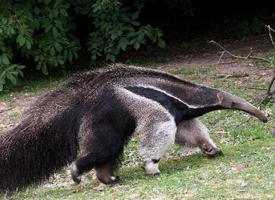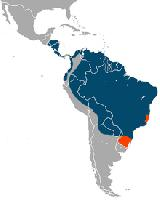
Weights and measures
| Length | from 1,8 to 2 m |
|---|---|
| Weight | from 29 to 65 kg |
| Tail lenght | from 64 to 90 cm |
Biological data
| Lifespan | 25 r |
|---|---|
| Length of gestation | 190 d |
| Number of young | 1 |
State of endangerment
| Endangered |
Animal description
The Giant Anteater (Myrmecophaga tridactyla), a remarkable creature native to Central and South America, stands as a testament to the incredible diversity of the animal kingdom. This species, also known simply as the ant bear, is the largest of its family, Myrmecophagidae, and is easily recognizable by its distinctive appearance and unique behaviors.Physically, the Giant Anteater possesses a long, slender body covered in coarse, greyish-brown fur with a distinctive black and white shoulder stripe that makes it unmistakable in its natural habitat. One of its most striking features is its elongated snout, which houses a small mouth and a remarkably long, sticky tongue that can extend up to 2 feet (60 cm). This specialized tongue is a crucial adaptation for its diet, primarily consisting of ants and termites. The Giant Anteater's robust, curved foreclaws are another adaptation for feeding, enabling it to tear open anthills and termite mounds with ease, while its hind feet have five toes with shorter claws.
Giant Anteaters are solitary animals, coming together only to mate. They communicate through a series of smells and sounds, as their hearing and sense of smell are much more developed than their sight. Females give birth to a single offspring after a gestation period of about 190 days, which then rides on its mother's back for several months, camouflaged by aligning its stripes with hers.
Despite its formidable appearance, the Giant Anteater has few natural predators, with jaguars and pumas being among the notable exceptions. However, it faces significant threats from human activities, including habitat destruction, roadkill, and hunting. Consequently, its status is listed as Vulnerable by the International Union for Conservation of Nature (IUCN), highlighting the urgent need for conservation efforts to ensure its survival.
Giant Anteaters have a significant role in their ecosystems as pest controllers, regulating insect populations and preventing overgrazing of vegetation by ants and termites. Their foraging behavior also contributes to soil aeration and nutrient redistribution, showcasing their importance beyond their charismatic presence.
In conclusion, the Giant Anteater is a fascinating and unique mammal that captures the imagination with its peculiar habits and appearance. It serves as a reminder of the wonders of biodiversity and the importance of conservation efforts to protect such irreplaceable species and their habitats.
Map of occurrence

New photos of animals
Top 10 animals
- Dolphin gull (Leucophaeus scoresbii)
- Diana monkey (Cercopithecus diana)
- Moustached guenon (Cercopithecus cephus)
- Galápagos tortoise (Geochelone nigra complex)
- Australian box jelly (Chironex fleckeri)
- Giant african land snail (Lissachatina fulica)
- Common house mosquito (Culex pipiens)
- Russian tortoise (Testudo horsfieldii)
- Greek tortoise (Testudo graeca)
- Japanese macaque (Macaca fuscata)